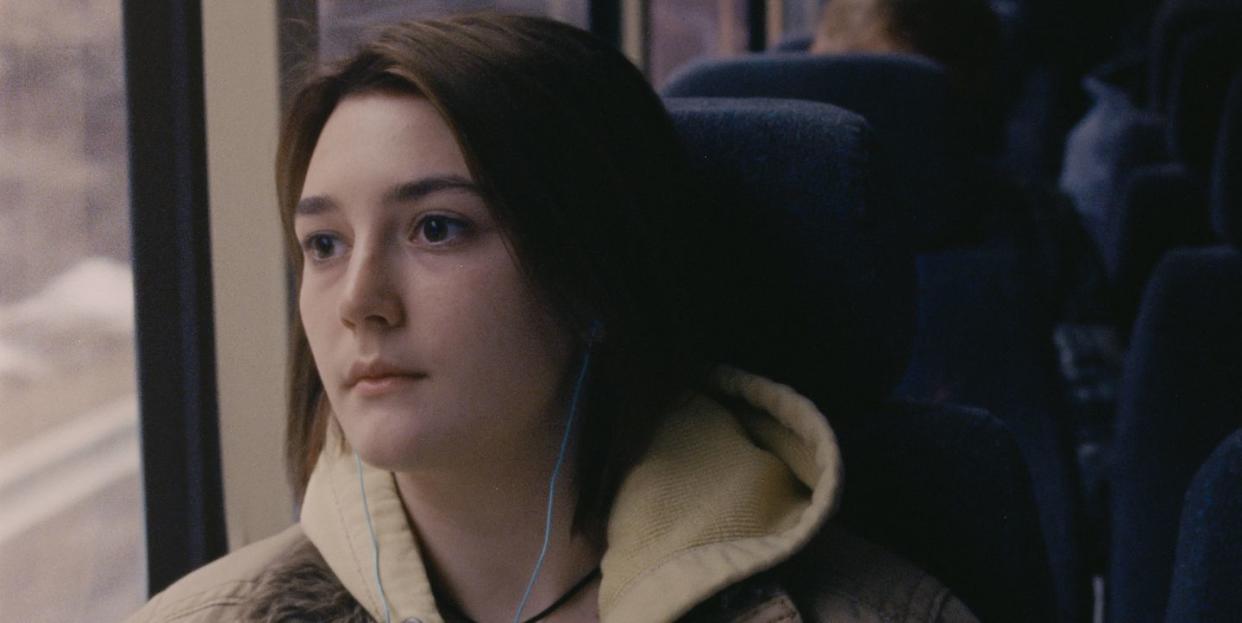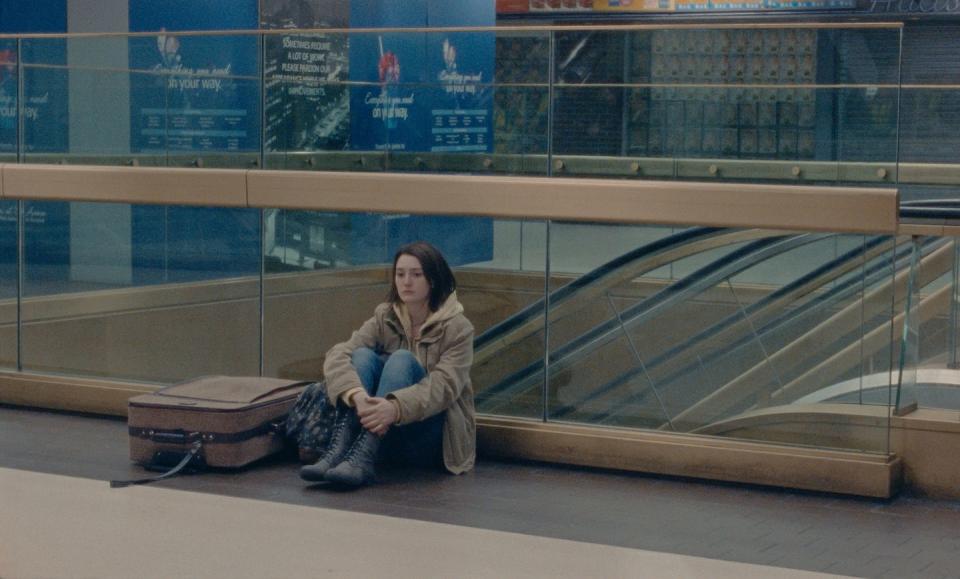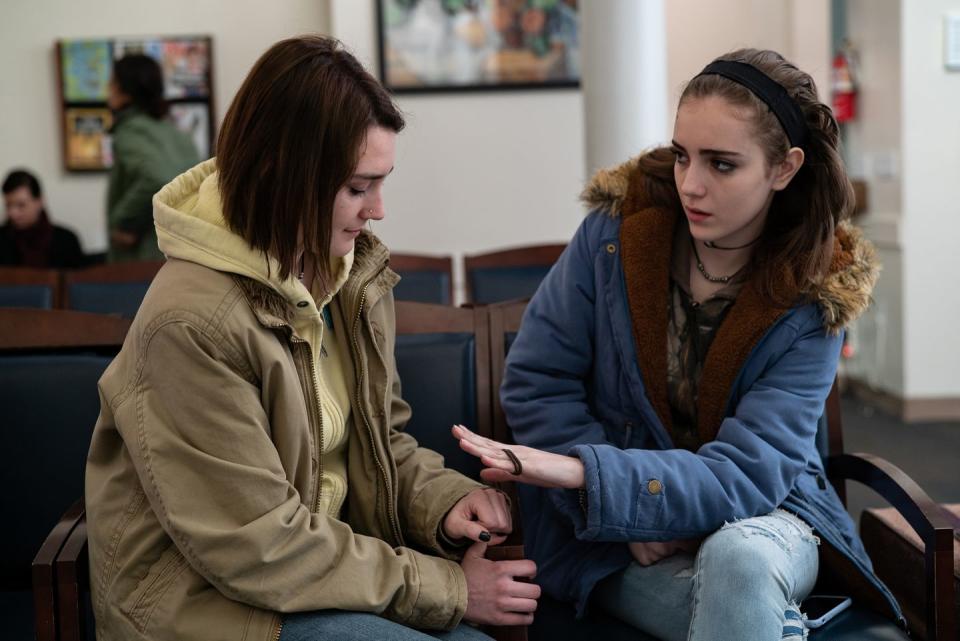In 'Never Rarely Sometimes Always,' a Total Newcomer Leads One of the Most Moving Films of the Year

Sidney Flanigan never saw herself as an actress. But after landing the lead role in one of the most moving features of 2020, her plans have changed.
The 21-year-old singer-songwriter from Buffalo, New York makes her film debut in Eliza Hittman’s Never Rarely Sometimes Always, a poignant depiction of how hard it is for a woman to get an abortion in the U.S. today. Flanigan plays Autumn, a 17-year-old girl from a working-class family in Pennsylvania who chooses to end an unplanned pregnancy. The women’s clinic in her hometown doesn’t offer abortion as an option. So, Autumn takes a bus ride to New York for the procedure with her cousin Skylar (Talia Ryder) in tow for support. Commuting is just the first hurdle in what turns out to be a bureaucratic obstacle course. At the Brooklyn Planned Parenthood, Autumn realizes she’s further along in her pregnancy than she was told, which means she must extend her stay so she can get the proper, two-day procedure for her case. With no place to stay and barely any money, she and Skylar spend their days lugging their baggage through the city and their nights sleeping in the subway or passing time in the bus station until they’re kicked out.
Never Rarely Sometimes Always offers a starkly realistic account of the process—from the security check-in at the clinic to the medical questionnaire moments before the operation. Hittman traveled to central Pennsylvania for research, filmed at real Planned Parenthood branches in New York, and used a real social worker as Autumn’s abortion counselor in the film. She saw over 100 actresses for the role of Autumn, but Flanigan, who Hittman’s partner briefly met years ago, was her point of reference. Eventually, she convinced Flanigan to take on the role herself.
As a newcomer, Flanigan’s fresh, unaffected presence makes Autumn feel all the more real, and in a way, that’s the point: In a time when abortion access is under threat, any woman could be in her shoes right now. Here, she talks to BAZAAR.com about her first acting role and why the film is so important for right now.
I was really impressed by your performance and I thought it was incredible knowing that this is your film debut. How does it feel?
It feels so unreal. I never really thought I'd ever be at this place in my life, especially as an actor because it's not something I was necessarily pursuing. I've been pursuing music for a long time and wasn't ever quite sure if I'd ever really make anything out of it. But it's also because of my pursuit of music that I got here. I came from a kind of blue collar family; I always thought that would be the world I'd be a part of. So it's really interesting to be where I am now. I'm really grateful.

You weren't really sure if you wanted to be a part of the project at first, so how exactly were you approached for the role and what went through your head?
When I was reached out to by a Eliza's partner, Scott, who I met when I was about 14, at first I wasn't sure what it was about at all. He just texted saying, "Well, Eliza is making a film. And she's interested in you auditioning." At first, I just thought I was totally incapable. You know, I didn't think that I could be an actor and I was worried that I wouldn't be able to leave for two months. I was worried that, "Oh, I have a band, how would I pay my bills while I'm gone?" And then I learned that I was able to pay my bills because [of it].
But it was just very terrifying at first. I didn't think I was capable of it and I ended up giving it a shot. I didn't want to miss out on that opportunity because I was afraid to take a risk. So I took it and I was very surprised when I got it. I read her script and saw that it was an abortion movie and I was like, "Oh, well that's really cool." And I was really impressed by how well [Eliza] had written it and I really wanted to be a part of that. So when I took on the opportunity and actually got it, it was like overwhelmingly cool.
What exactly was your initial reaction when you were reading about Autumn in the scripts? How did she come off to you and how did you relate to her?
The first time I read the script, it's a much different impression of how I feel about the character now because honestly I feel like she'd been fleshed out. It's very hard trying to read a character on a page, especially because this movie was very not dialogue-driven, but for the most part, I feel like she's guarded and a little private, but also decisive. She made a decision, and she followed it through. But at the same time, I do kind of think about how I haven't really imagined what she may be like outside of crisis. I feel like all the traits that I have associated with her are very circumstantial.
How did your impression of her change as you embodied her and told her story?
The first time I read it I felt like it was strange how quiet she was, but then, over time, I was like, "Well, she's internally processing a lot of stuff and came to empathize a little more." Also, after watching some of Eliza's movies and understanding that this is sort of her style, it's not that people don't necessarily talk or communicate that way, but it's just the style of the movie. I really appreciate that this is subject matter because, otherwise, it feels like the characters might be explaining things too often just for the audience's understanding. I think it's good that there's this quiet communication because everything can just be picked up on in subtlety.
It seems like from the way that you reacted to the script that you were interested in shedding light on an abortion story, but the film is very eye-opening in ways that I feel like we've never really seen movies before. Did it kind of open your eyes to that whole process?
Yeah. I mean, I am someone who grew up here in New York State. So I've always been aware of abortion being under threat and being an issue that's always been controversial. But I didn't realize the extent of the obstacles are living in other places. This movie was very educational for me, learning about the crisis centers and the underage thing for people needing parental consent in other states. I didn't realize how common it is for women to travel for abortions, so this has really been extremely educational.
I thought the "never, rarely, sometimes, always" questions was so powerful even though, you were just answering straightforward questions. Was that especially emotional for you? What was it like filming that?
It was really intense. I kind of felt like I had to reach for a really personal place in my own experience, even if it wasn't necessarily in context with the scene, just something of the same emotional substance or level to try and bring that out.
There's a big focus on Autumn and Skylar's relationship as cousins and you and Talia have a really great bond on screen. What was your dynamic like during filming and rehearsals?
We ended up getting really close. But rehearsal period was only two days. So Eliza did these like bonding exercises with us. She gave us these journals and they had writing prompts in them with really personal questions and she had Talia and I answer them and share our answers privately. Talia and I had this secret little bond and, during rehearsals, which were only two days in Eliza's apartment, we did this thing where we did each other's makeup while running through some of the scenes to create sort of that intimacy. We also discovered that we were both from the same place. We're both from Buffalo. So that was kind of an interesting connecting factor that helped us, like we came from the same world almost.

What kind of research do you have to do for the part?
I didn't necessarily do any kind of conventional research. I got the part and then things happened, and started real quick. It was a very quick film. It was a 27-day shoot. We had two days of rehearsal. Everything was so fast. And also not having been an actor in previous life, I just didn't have a conventional process. So I tried my best as a musician. I feel like I already have to find a certain emotional headspace in order to deliver a performance pertaining to each song and you take on a persona on stage. So I'd try my best to transfer that over to acting.
Also as a musician, you got to work with Sharon van Etten, who plays Autumn's mom, in the movie. What was a big deal for you?
It was super cool. I love Sharon and her music is so amazing. So it was really magical getting to meet her and work with her.
Did you guys get to exchange notes or talk about music at all?
She was only on set for a couple of days, so we didn't get to have too many in-depth conversations. There was one before we actually shot any scenes with her. Eliza set up a little meet-up for Sharon and I. So I went to Sharon's apartment and I hung out for maybe like an hour. You can only get to know so much about someone in an hour, but I'm still so grateful for even the little moments I had gotten to share with her.
And what about your future plans for music?
I still play solo acoustic stuff and I'm in the process of developing a new project back home in Buffalo.
Who are some people that you looked up to when you were growing up, whether it was on screen or in music?
I was kind of raised on punk rock music. So it's really like a numerous amount of artists, like the entire genre was kind of an influence on me. Nowadays, I think specific artists I really like are Brian Fallon from the Gaslight Anthem, Kim Gordon from Sonic Youth, especially a lot of female musicians that kind of pioneered the women's movement in punk music and underground music. It's really cool to see.
Those are all really great names. What do you hope audiences get from Never Rarely Sometimes Always when they watch it?
I just really hope that it gives them a realistic glimpse into what the [abortion] experience can be like and the woman's perspective of what the world is like with the hostility that there is from other men. And that it gives people a real look and so that they can maybe empathize and put themselves in other people's shoes.
Never Rarely Sometimes Always is now available on Prime Video, iTunes, and other video on-demand platforms.
This interview has been edited and condensed for clarity.
You Might Also Like


